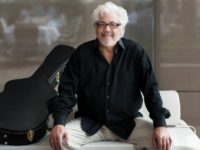photo: http://www.widehiverecords.com
While we’ve talked about a lot of fusion guitarists over the last five years, this is about a new album by the first one. That’s right, though John McLaughlin is widely regarded as the guy who shaped and defined jazz-rock guitar, no one was successfully reconciling the two elements into a coherent, identifiable playing style before Larry Coryell. While only about 21 years old in 1966, he joined the proto-fusion group The Free Spirits (a group drummer Bob Moses was also in). A little later, Coryell was part of a classic Gary Burton’s quartet with Steve Swallow and Moses in 1967-8 that was arguably the first real fusion group, largely because of Coryell himself. As a leader, he made some very fascinating records of his own in the late 60’s and early 70s that got submerged in the tidal wave of rock-jazz started by Miles Davis’ Bitches Brew. Coryell’s best known fusion work came from his ’72-’75 Eleventh House unit that was ironically seen as a follower of Davis and Davis alumni Chick Corea (Return To Forever), Herbie Hancock (Headhunters) and McLaughlin (Mahavishnu Orchestra). So, Coryell kind of got the short shrift in recognition of his contributions to this hybrid genre.
There’s probably not as many studio “house” bands as there used to be. Motown (The Funk Brothers), Stax (Booker T. and the MG’s) and Muscle Shoals had them, and Blue Note Records essentially had a core set of musicians who tended to be sidemen on most records made during their classic era. These days, Gregory Howe’s Wide Hive Records of Berkeley, CA has one too, a group of experienced crack session players that includes Josh Jones (percussion), Thomas McCree (drums), Matt Montgomery (bass), Adam Shulman (keys), Mike Rinta (trombone), Doug Rowan (saxes). Somebody came up with the bright idea of putting Coryell together with the Wide Hive Players and the results came out last April 12, titled rather directly, Larry Coryell with the Wide Hive Players.
This is a fusion album through and through, but not some watered down, updated version of it; there is nothing on this record that sounds past 1972 on it. Coryell fans might think this is a follow-up to Offering or that first Eleventh House album, and to a large degree it is. Certainly, Coryell is playing like it’s bell bottoms and Watergate all over again. All the earmarks from his signature style from that era are there: those flurries of notes, the stinging single note lines, the full chord growl, and his penchant for squashing or clipping notes, that perfect combination of rough-edged mannerisms and clean virtuosity that he practically invented. And here’s the most important lesson he leaves for budding guitar virtuosos: playing with a lot of soul. Many have ignored that advice, Coryell still lives it.
Though he’s the featured star, the backing band plays a major role in shaping the sound. Songs not written by Coryell are written by various band members plus producer Howe, sometimes with Coryell himself. That suggests a collaborative effort. The trombone-sax, electric piano and funky drums doesn’t evoke memories of Eleventh House as it does another jazz-rock band from the same time frame: the Crusaders. These thirteen songs aren’t among the most challenging in Coryell’s discography by a longshot, but most of them have some good melodies going for it that go well above serving as merely launching pad for aimless jamming.
There’s not a single clunker track on an album that ranges from good to great, but these four songs sequenced in a row are alone worth the price of the CD: McCree’s “Purdie Shuffle” paces the in-the-pocket vibe of “Return Of Shirtless” (video above) and Coryell deftly manipulates his Gibson ES to wail, roar and plead, working with and around the horn charts like a real pro. This has the real feel of a old fusion classic song. “December Blues” is a straight up blues, but here again Coryell’s guitar makes it into something more than just that, by playing Larry Coryell licks, not copping someone else (and the piano-driven WHP’s give him a good, gutbucket backing). “Moody On My Mind,” presumably a tribute to the just-deceased James Moody, is Coryell overdubbing an acoustic guitar over another, accompanied only by light percussion. It’s light, pretty Latin stylings is a little taste of the his acoustic guitar phase that immediately followed his classic fusion one (the album ender “One For T.G.” is another almost-solo acoustic guitar number). Imagine an instrumental Chicago’s “Only The Beginning” with a funkier backbeat and the bridge swapped out for another and you’ve basically described “Moose Knuckle.” George Brooks makes a cameo here to supply a slippery sax solo and Coryell steps out from behind a soul swaying rhythm guitar to create a sweet ‘n’ sassy solo himself.
Coryell has made several returns to his fusion beginnings over the years, but it took this little house band from Berkeley to bring him back with the full-on fire, fury and spirit of those pioneering times. You don’t even have to be a fan of his or a guitar afficionado to dig this disc; anyone who likes that old school funky rock-jazz with a few delectable diversions will find a lot to like about it. The old Larry Coryell, the Father of Fusion Guitar, is back.
[amazon_enhanced asin=”B004SL6CPY” /] [amazon_enhanced asin=”B004NTMNDQ” /] [amazon_enhanced asin=”B000000EL4″ /] [amazon_enhanced asin=”B000000ELO” /] [amazon_enhanced asin=”B0047DVRQW” /]
- Claudio Scolari Project – ‘Bloom’ (2025) - June 12, 2025
- Denny Zeitlin – ‘With a Song In My Heart: Exploring The Music of Richard Rodgers’ (2025) - June 4, 2025
- Ches Smith Quartet – ‘Clone Row’ (2025) - May 30, 2025



